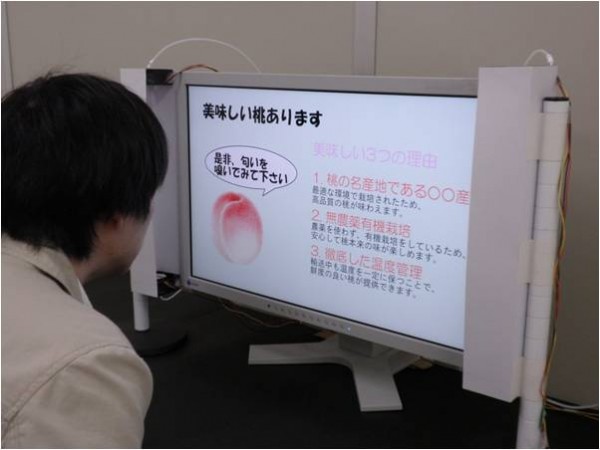For all of us that have been designing food-safety products, here’s a company that put its money where its mouth is.
These chopsticks analyse oil for cleanliness and water acidity levels.
As seen on the Shanghaiist:Â http://shanghaiist.com/2014/09/04/baidu-smart-chopsticks.php
This weekend the latest edition of Music Tech Fest will take place in London. MTF will most likely come to Umeå in 2015.
For an intro into what Music Tech Fest is, see an interview with its current director, Andrew Dubber:
After using projection mapping on buildings and cars, using the human face as a canvas seems totally plausible. Beautifully scary!!!
[via]
Calling all hackers, designers, engineers, artists, researchers, and inventors…
The goal of the contest is to invent new interactions on state-of-the-art hardware. We give you the hardware and you show us what you can do. You will demo your creations at the UIST conference on October 7th 2014, and the winners will be announced the same evening.
This year’s hardware focuses on bringing more software-centric students into the fold for the contest. It’s a hardware prototyping platform that runs top-to-bottom in JavaScript; network communication, user interfaces, sensors, actuators, and all the rest are controlled through JavaScript to get you up and running fast and let your creativity flow. The Hardware: The Kinoma Create.
The Create comes with a built-in touchscreen, WiFi, Bluetooth, a front-facing sensor connector, and a 50-pin rear sensor dock. It’s all programmed wirelessly using Kinoma Studio, the provided software. Studio can compile code for the Create, as well as for Android devices: this means that you can have hardware interoperate with your cell phone. This software also allows you to simulate your sensors, so you can get started with your designs before you receive your device! Marvell will also provide example code for a variety of sensor and interface tasks to get teams started quickly.
Through Kinoma, we are also providing teams with a sensor budget of $50 to acquire sensors and actuators for their projects. We’re focusing on household interfaces this year.
For more details and to register by the deadline of August 7th, visit the contest website at: bit.ly/uistcontest2014.
For questions, email the contest chairs at studentinnovation@uist.org. Make sure to follow us on facebook.com/uistcontest and twitter.com/uistcontest, where we will be posting updates.
We are a company based in Sweden, intent on making incredible diving experiences even better. We want to improve the way divers communicate, as well as actively support the diving community. Our first product, the Smart Console, enables divers to share information across their own local subaquatic network.
http://www.youtube.com/watch?v=mPNGdMcYeTA
http://www.youtube.com/watch?v=g-MePOxpY3o
http://www.youtube.com/watch?v=l0X7-sbRlnE
Skatehack is an urban art & research project with a focus on skateboarding, hacking, and open source technologies.
Degree presentation: check.
Exhibition: check.
Design Talks: check.
Now you have the materials just lying around to put in front of a professional Jury. So why not enter into the IxD awards?!
Deadline is August 31, 2014.
Have a look at last years finalists and winners to see that, really, all you IxD’s have a very good chance!
http://www.youtube.com/watch?v=7Y35m1OpPAw
A bit old (september 2013), but still a nice gig to put all this together!
https://www.youtube.com/watch?v=Bo11JJgj1cU
View more stories at madewithcode.com and https://www.youtube.com/user/madewcode/videos
Edwards, a Harvard professor and head of science/art innovation lab Le Laboratoire, just unveiled the first commercial version of his oPhone, the DUO, a cylindrical gadget that transmits scents (called oNotes) via an app called oSnap. Think of it as a mobile messaging platform for sending aromatic emoticons. The oPhone might look like a strange medical device, but Edwards is betting it could usher in the beginning of the aromatic communication age.
(http://www.wired.com/2014/06/you-can-now-buy-this-scent-sending-phone)
I was so happy to read this article on wired today. I have been waiting for such a device to go from research to production since Google’s Nose Beta, their 2013 April’s fool joke. However, there is lab research in technologies that allows the reproduction of odours. A design team from the Tokyo University of Agriculture and Technology revealed this odoriferous monitor at the IEEE Virtual Reality conference last month (March 2013). The concept is simple: a television monitor framed with four fans, each pumping odors in a precise direction. The odors are generated using hydrogel chips that vaporize when heated. (http://thecreatorsproject.vice.com/blog/wake-up-and-smell-the-coffee-google-nose-beta-already-exists)

Photo courtesy of IEEE Virtual Reality Conference
In the beginning on 2013 I made a new friend in Amsterdam, Kate McLean. She is a PhD candidate within Information Experience Design at the Royal College of Art and she is working on sensonry maps. She applies academic research with field studies (smell walks), recruiting different levels of sniffers (perfumers, evaluators and admin staff from International Flavors and Fragrances (IFF), landscape architects, service designers, an art historian, a film extra etc) in cities of interest. The outcome of her research is a graphical representation of odours mapped as artistic artefacts. She has been exhibiting her Sensory maps since 2010. I had the luxury of walking and smelling Jordan in Amsterdam in May 2013 and that gave me some food for thought.
Therefore, I would like to raise the following questions. If we allow the individual user to record odours in urban environments, how can we contribute into the multi-sensory experience of cities? Could we encourage participation from the individual user to create an additional layer for Google maps? Taking into consideration that odours can fade away, how could archives of sensory maps contribute to historical evidence of urban development? Would that be a degree thesis or a business idea?
You can support oPhone on Indiegogo.
The Next Black – A film about the Future of Clothing
2800 iPod Nano screens and a bunch of clever people gives a pretty amazing digital facade to the Weill Cornell Medical College (WCMC) in Manhattan. Hat off to Daniel Hirchmann and his collaborators for building this project. Some folks my remember Daniel who came over and taught the Interactive Lighting week in the Experience Prototyping course a few years ago.
See the full blog post at CreativeApplications.Net


